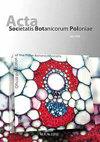斯洛伐克耕地杂草植被:多样性和物种组成
IF 0.8
4区 生物学
Q3 PLANT SCIENCES
引用次数: 7
摘要
可耕地是斯洛伐克最广泛的栖息地之一,但最近,还没有对这些田地中杂草植被的物种组成和结构进行研究。因此,我们研究了可耕地杂草植被的结构,并检测了α-和β-多样性。不同作物类型的507个植物社会学亲缘关系的数据集包含46个植物科的407个植物分类群。本土植物以外来植物为主,古生植物以新生植物为主,14种植物属于入侵类群。数据集中最常见的物种是穿孔三棱、酸枣和紫百合。杂草主要是兽生植物、b-和a-euhemerobic、竞争对手和杂草,通过种子繁殖和昆虫授粉。杂草植被的β-多样性随着海拔和温度的升高而降低,并且潘诺尼库姆地区高于Carpaticum地区。饲料+休耕田的β-多样性最高,其次是谷类和块根作物田,残茬的多样性最小。贝塔多样性从春季到夏季增加,秋季再次略有下降。去趋势对应分析表明,杂草植被的主要成分周转与光照、温度、湿度和海拔高度有关。杂草植被是景观中的一个重要栖息地,为许多受威胁的植物提供庇护,这种植被在农业生态系统食物链中具有重要功能。本文章由计算机程序翻译,如有差异,请以英文原文为准。
Weed vegetation of arable land in Slovakia: diversity and species composition
Arable fields are among the most widespread habitats in Slovakia, but recently, there have been no studies regarding species composition and structure of weed vegetation in these fields. Therefore, we studied the structure of arable weed vegetation and detected α- and β-diversity. The dataset of 507 phytosociological releves in different crop types contains 407 plant taxa in 46 plant families. Native plants dominated over aliens, archaeophytes dominated over neophytes, and 14 plants belonged to invasive taxa. The most common species in the dataset were Tripleurospermum perforatum , Cirsium arvense , and Viola arvensis . Weeds were mostly therophytes, b- and a-euhemerobic, competitors, and ruderals, reproducing by seeds and pollinated by insects. The β-diversity of weed vegetation decreased with elevation and temperature and was higher in the Pannonicum than the Carpaticum region. The highest β-diversity was established in fodder+fallow fields, followed by that in cereals and root-crop fields, and the smallest diversity was found in stubble. Beta-diversity increased from spring to summer and slightly decreased again in fall. Detrended correspondence analysis indicated that the major compositional turnover of weed vegetation was related to light, temperature, moisture, and elevation. Weed vegetation constitutes an important habitat in the landscape that provides refuge to many threatened plants, and this vegetation has important functions in the agro-ecosystem food chain.
求助全文
通过发布文献求助,成功后即可免费获取论文全文。
去求助
来源期刊
CiteScore
2.00
自引率
10.00%
发文量
18
审稿时长
1 months
期刊介绍:
The journal has been published since 1923 and offers Open Access publication of original research papers, short communications, and reviews in all areas of plant science, including evolution, ecology, genetics, plant structure and development, physiology and biochemistry.

 求助内容:
求助内容: 应助结果提醒方式:
应助结果提醒方式:


